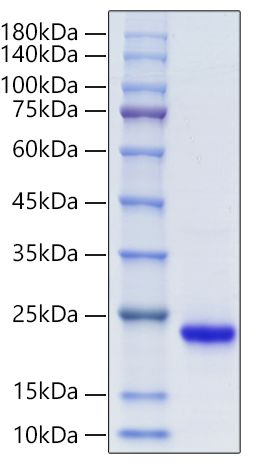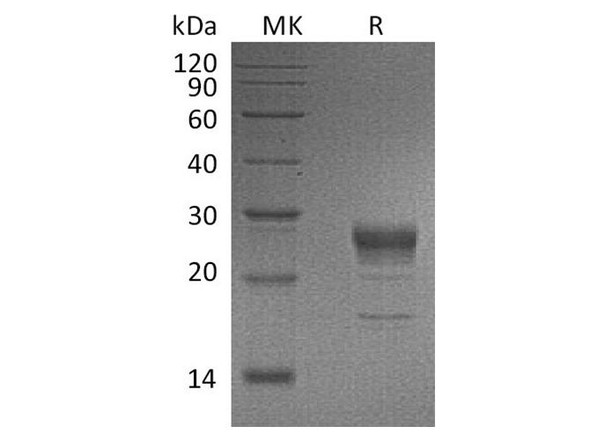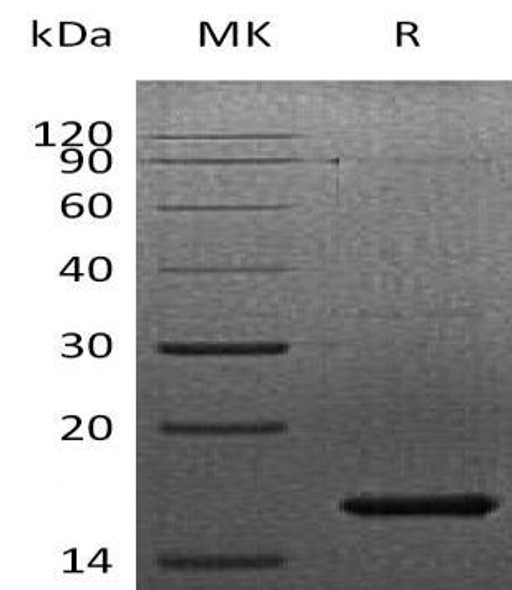Description
Recombinant Mouse FGF-7/HBGF-7/KGF Protein
The Recombinant Mouse FGF-7/HBGF-7/KGF Protein is a high-quality recombinant protein designed for murine biological research applications. This protein serves as an essential reagent in mouse model studies, comparative immunology research, and preclinical therapeutic evaluations, enabling scientists to investigate FGF-7/HBGF-7/KGF biology and its relevance to human disease mechanisms through translational research approaches.
This product (SKU: RPCB0112) is produced using E. coli and features a NO-Tag tag for convenient detection and purification. The protein exhibits a calculated molecular weight of 18.75 kDa with an observed molecular weight of 20-25 kDa under denaturing conditions, achieving ≥ 95 % as determined by SDS-PAGE.. Functional bioactivity has been validated through rigorous quality control assays, confirming its suitability for demanding research applications.
Key Features
| High Purity by Affinity Chromatography | |
| Mammalian & Bacterial Expression Systems | |
| High lot-to-lot consistency via strict QC |
| Product Name: | Recombinant Mouse FGF-7/HBGF-7/KGF Protein |
| SKU: | RPCB0112 |
| Size: | 10 μg , 20 μg , 50 μg , 100 μg |
| Reactivity: | Mouse |
| Synonyms: | Fibroblast growth factor 7, FGF-7, Heparin-binding growth factor 7, Keratinocyte growth factor, Fgf7, Fgf-7, Kgf |
| Tag: | NO-Tag |
| Expression Host: | E. coli |
| Calculated MW: | 18.75 kDa |
| Observed MW: | 20-25 kDa |
| Gene ID: | 14178 |
| Protein Description: | High quality, high purity and low endotoxin recombinant Recombinant Mouse FGF-7/HBGF-7/KGF Protein (RPCB0112), tested reactivity in E. coli and has been validated in SDS-PAGE.100% guaranteed. |
| Endotoxin: | < 1 EU/μg of the protein by LAL method. |
| Purity: | ≥ 95 % as determined by SDS-PAGE. |
| Formulation: | Lyophilized from 0.22 μm filtered solution in PBS (pH 7.4). Normally 8% trehalose is added as protectant before lyophilization. |
| Bio-Activity: | Measured in a cell proliferation assay using BaF3 mouse pro-B cells transfected with human FGFR2b. The ED50 for this effect is typically 20-100 ng/mL |
| Reconstitution: | Centrifuge the vial before opening. Reconstitute to a concentration of 0.1-0.5 mg/mL in sterile distilled water. Avoid vortex or vigorously pipetting the protein. For long term storage, it is recommended to add a carrier protein or stablizer (e.g. 0.1% BSA, 5% HSA, 10% FBS or 5% Trehalose), and aliquot the reconstituted protein solution to minimize free-thaw cycles. |
| Storage: | Store at -20℃.Store the lyophilized protein at -20℃ to -80 ℃ up to 1 year from the date of receipt. After reconstitution, the protein solution is stable at -20℃ for 3 months, at 2-8℃ for up to 1 week. |
Fibroblast growth factor 7 (FGF7) is a member of the fibroblast growth factor (FGF) family of proteins. FGF7 plays an important role in regulating the proliferation, migration, and differentiation of cells. FGF7 is of stromal origin and produces a paracrine effect on epithelial cells. FGF7 is a mesenchyme-specific heparin-binding growth factor that binds FGF receptor 2 (FGFR2) to regulate numerous cellular and physiological processes. FGF7/FGFR2 promotes invasion and migration in human gastric cancer. FGF7 is specifically utilized as a paracrine factor during the process of differentiation of the epidermal layers in the regenerating scales and in particular for beta-cells differentiation. FGF7 over expression is associated with advanced clinical features in patients with upper tract and bladder urothelial carcinoma, justifying its potential prognostic value for urothelial carcinoma.







